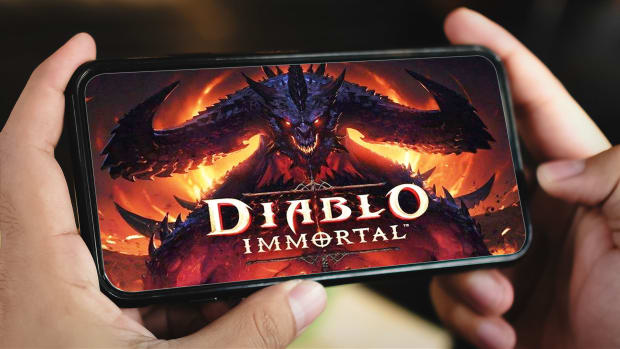On June 2, longtime gaming publisher and fan favorite Activision Blizzard (ACTI) released its first mobile game themed on its "Diablo" franchise.
After a long, tumultuous year involving more than a dozen lawsuits over sexual harassment, investor unhappiness about its upcoming sale to Microsoft, and complaints about CEO Bobby Kotick, the company was sorely in need of some good press -- especially in the wake of a first-quarter revenue decline of more than $500 million year over year.
Releasing its first free-to-play title in a franchise popular since its launch in 1996 seemed like a great way to do it, and even though "Diablo Immortal" was for mobile rather than a major console release, the video game world was very excited about it.
Designed in the style of many other mobile games, "Diablo Immortal" features a variety of microtransactional options for players who wish to make their in-game characters more powerful.
However, the game elicited a negative uproar after fans did the math and realized that to fully max out their in-game character, a move necessary to compete in many of its higher level activities, players would need to spend $110,000.
Further deepening the blow, Activision Blizzard also implemented a "loot box" system for players to get the items they want. Loot boxes are the equivalent of buying a chance at winning the item you want, not the item itself.
Activision Blizzard also chose not to clarify the percentage chance a buyer had of actually getting the item they wanted from a loot box, causing a clash with gambling regulations in Belgium and the Netherlands which banned it from releasing the game in either country.
Now, however, after only two weeks on the market, data is surfacing on how much money "Diablo Immortal" has made -- and it's clear from the results that we can expect to see more of an industry lean towards these microtransactional methods, ethical or not, in the very near future.

Activision Blizzard
How Much Money Did This Game Make?
"Diablo Immortal" has made more than $24 million since it was released a little over two weeks ago, and has been downloaded by more than 10 million users.
The majority of that spending comes from U.S. players -- 43 percent -- followed by South Korea at 23 percent, Japan, Germany, and Canada at 8 percent, 6 percent, and 3 percent respectively. The remaining 17 percent of revenue comes from other markets.
That sounds like a big success for Activision Blizzard, and it is. This makes "Diablo Immortal" its second-highest money maker of all time .
But when compared to the tidal wave of negative user scores the game has amassed since launch (currently it holds a 0.4 rating on media website Metacritic), it seems like something is awry.
What's The Big Deal With Microtransactions?
While most microtransactions in mobile games cost a few dollars and offer either more time to play or access to hints to make the game easier, over recent years pricier options have shown up, encouraging players to spend hundreds at the touch of a button.
While ethically questionable and surely a play on the same methods gambling uses to exploit people's weaknesses, from a financial perspective it's been clear that microtransactions work when it comes to getting people to spend money in the gaming world.
The mobile gaming industry made $93.2 billion worldwide in 2021, with a forecast to increase to $116 billion by 2024. King, the company behind the immensely popular match-3 game "Candy Crush Saga" (a company now owned by Activision Blizzard, by the way), has been saying microtransactions are the future of gaming since 2014.
So while people's reactions to mobile transactions in free-to-play is that they can be an ethically unsound way for video game companies to make money depending on how much the game requires a player to spend in order to complete them, the bottom line--the dollar-- is what speaks the loudest.
Based on the results of "Diablo Immortal," players have signaled to Activision Blizzard that not only are they okay with being seduced by a free-to-play structure that pulls you far enough in to get you addicted before asking you to spend money, but that they want more of it, too.
Give the customer what they want, right?







